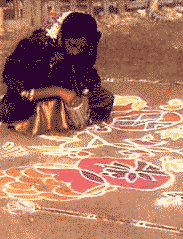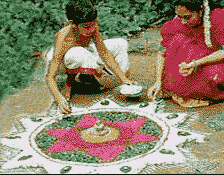| PONGAL |
|
| Celebrated In
:
Tamilnadu |
|
| Celebrated to
mark :
Withdrawl of the Southeast Monsoons as well as
the reaping of the Harvest. |
|
| Duration :
4 days |
|
| In the month
of :
Thai (January) |
|
|
|
| A majority of the population of India depends
on agriculture. As a result, most of the festivals are also related to the
agricultural activities of the people. These festivals are celebrated with
different names and rituals in almost all the states of India. Pongal is an
important festival of Tamil Nadu, which is celebrated to mark the withdrawal of
the Southeast monsoons as well as the reaping of the harvest. It falls in the
month Thai and is strictly a rural festival.
|
|
The Legend Behind The
Celebrations
There are few interesting legends behind the Pongal
celebrations. The most popular among them related to the celebrations of the
first day of the Pongal festival goes like this - Lord Krishna lifted the
Govardhan Mountain on his little finger to shelter his people and save them
from being washed away by the rains and floods.
According to another the third day of Pongal is celebrated because Lord
Shiva once asked Nandi, his bull, to go to earth and deliver his message to the
people - to have an oil bath every day and food once a month. But Nandi got it
all mixed up when he delivered the message, and told the people that Shiva
asked them to have an oil bath once a month and eat every day. |
 |
|
|
| Shiva was displeased, and told Nandi that
since the people would now need to grow more grain, Nandi would have to remain
on earth and help them plough the fields.
|
|
| Mattu Pongal is also called "Kanu Pongal", and
women pray for the welfare of their brothers. This is similar to the festivals
of Raksha Bandhan and Bhai Dooj celebrated in some states of North India.
|
|
About The Festival
The festival is celebrated for four days and the celebrations on the first day
of the Tamil month Thai and continues for the three days. The month of Thai is
supposed to be very auspicious for every kind of activity. The Sun is
worshipped for his rays are responsible for the life on earth. |
|
| It is the biggest harvest festival, spread over
four days. 'Bhogi' is celebrated on January 13, 'Pongal' on January 14, 'Mattu
Pongal' on January 15, and 'Thiruvalluvar Day' on January 16. Thiruvalluvar has
done a great contribution to Tamil literature with 'Thirukkural'. There are
1,330 verses in this work and they talk about all aspects of life. |
 |
|
|
| In fact, the name of the festival is derived
from Pongal, a rice pudding made from freshly harvested rice, milk and jaggery.
The first day, "Bhogi Pongal", is a day for the family. "Surya Pongal", the
second day, is dedicated to the worship of Surya, the Sun God. The third day of
Pongal, "Mattu Pongal", is for the worship of the cattle.
|
|
| Cattle are bathed, their horns polished and
painted in bright colours, and garlands of flowers placed around their necks.
Pongal is associated with cleaning and burning of rubbish, symbolizing the
destruction of evil.
|
|
| All the four days of Pongal have there own
individual significance. On the first day, delicious preparations are made and
homes are washed and decorated. Doorways are painted with vermilion and
sandalwood paste with colourful garlands of leaves and flowers decorating the
outside of almost every home. On this day 'Bhogi' or the Rain God is
worshipped.
|
|
Rituals Followed
A typical traditional Pongal celebration has a number of rituals attached to
it. The place where the Pongal Puja is to be conducted is cleaned and smeared
with dung, a day prior to the festival. People generally choose an open
courtyard for this purpose. |
|
| 'Kolams' (Rangoli) generally drawn with rice
flour are special to the occasion. The idea behind using rice flour is that the
insects would feed on it and bless the household. At the centre of it a lump of
cow dung holds a five-petal pumpkin flower, which is regarded as a symbol of
fertility and an offering of love to the presiding deity. In a similar way the
houses are also cleaned, painted and decorated. Kolams (Rangoli) are made in
the front yards of the houses and new clothes for the whole family are bought
to mark the festivities. Even the cattle are gaily caparisoned with beads,
bells and flowers-their horns painted and capped with gleaming metals.
|
|
The Tempting Recipes
Sweet rice, known as "Pongal", is cooked in a new earthenware pot at the same
place where puja is to be performed. Fresh turmeric and ginger are tied around
this pot. Then a delicious concoction of rice, Moong Dal, jaggery and milk are
boiled in the pot on an open fire. This Pongal, according to ritual, is allowed
to boil and spill out of the pot. Pongal, once ready, is offered to God first,
on a new banana leaf along with other traditional delicacies like Vadas,
Payasam, etc. Besides this, sugarcane, grain, sweet potatoes, etc are also
offered to the Sun God.
|
|
Processions
A procession is taken out from the Kandaswamy (also spelt as Kandaswami) Temple
in Chennai. In Madurai, Tanjore and Tiruchirrapalli, where Pongal is known as
Jellikattu, bundles of money are tied to the horns of bulls, and villagers try
and wrest the bundles from them. Community meals are made from the freshly
gathered harvest and enjoyed by the entire village. |
|
|
|
|
|